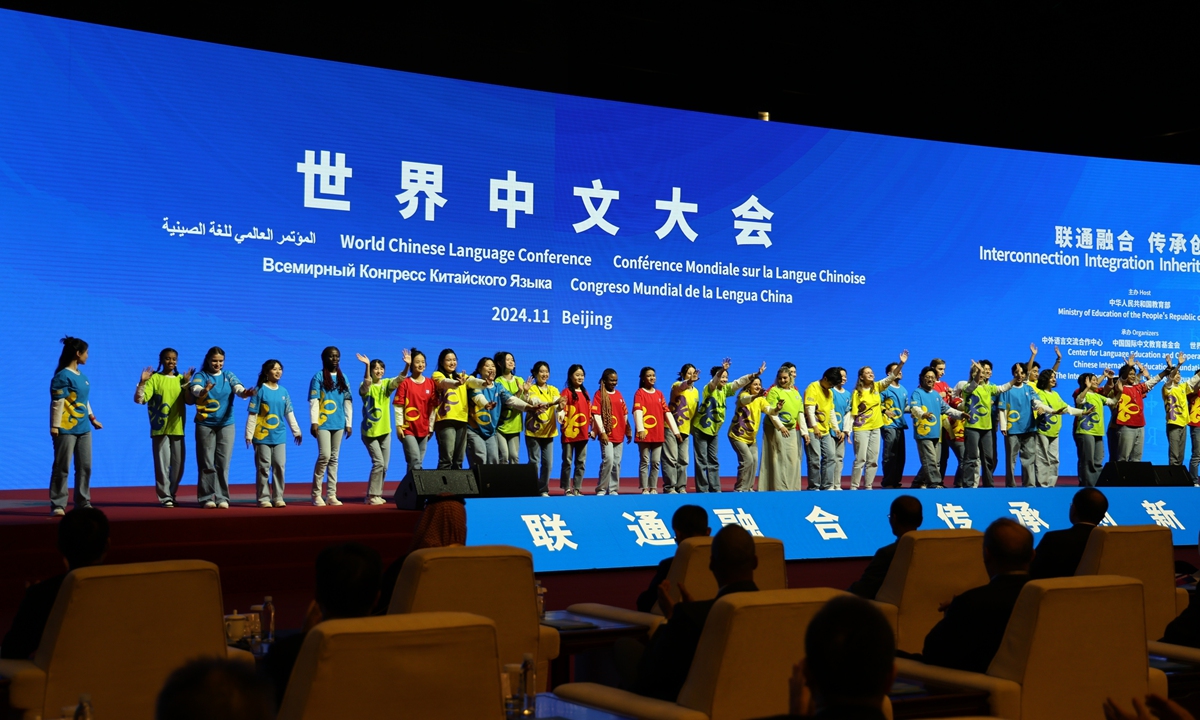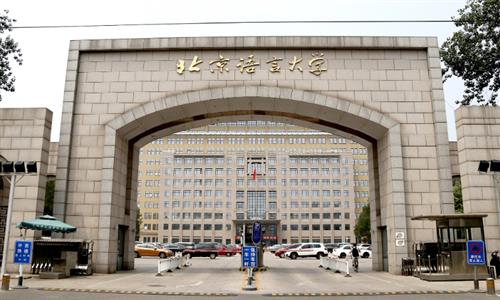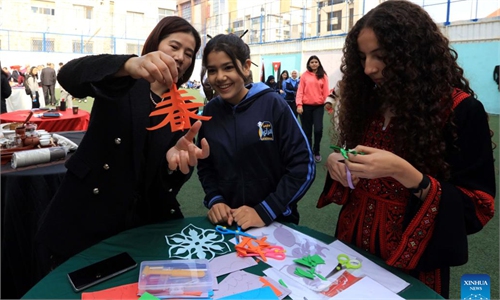World Chinese Language Conference opens to bridge cultures
Spirits of GCI bestowed upon language education

World Chinese Language Conference at China National Convention Center in Beijing on November 15, 2024. Photo: Courtesy of the Center For Language Education and Cooperation
Chinese President Xi Jinping sent a congratulatory letter to the 2024 World Chinese Language Conference, which opened in Beijing on Friday.
In his letter, Xi also congratulated the Confucius Institute on the 20th anniversary of its establishment.
Xi said the Chinese language, which encapsulates the millennia-old wisdom of the Chinese civilization, is an important public cultural product that China has contributed to the world.
China's responsibility as the native-language country is to support and facilitate the international community in conducting Chinese language education, Xi said.
Xi expressed the hope that the conference will enhance interconnection and integration, build consensus, and strive to build bridges of lingual connectivity, understanding and mutual trust, and mutual learning between civilizations, thus contributing to jointly building a community with a shared future for mankind.
The conference, running from Friday to Sunday, brought together over 2,000 participants from more than 160 countries and regions, with many stressing to the Global Times the importance of language education in connecting the difference cultures and saying they highly value the role that Global Civilization Initiative (GCI) has played in the cultural exchanges.
With the theme "Interconnection, Integration, Inheritance, Innovation," the 2024 conference opened at China National Convention Center in Beijing on Friday, aiming to promote the sustained and vigorous development of international Chinese language education, support relevant countries and regions in carrying out Chinese language teaching and deepen exchange and mutual learning among different cultures.
During the conference, an exhibition titled with "Extraordinary 20 Years: Exhibition of Educational Achievements by Confucius Institute at its 20th Anniversary" has also opened to the public. 2024 marks the 20th anniversary of the Confucius Institute worldwide.
According to the exhibition, up to now, 499 Confucius Institutes and 764 Confucius classrooms have been set up in 161 countries and regions to help cultivate more than 20 million students of all kinds to learn Chinese language and 85 countries have incorporated Chinese language into their national education system.
Hassan Muhsan A Khormi, Deputy Minister of Education, the Kingdom of Saudi Arabia, stated at the conference that Saudi Arabia and China have had close cooperation and achieved fruitful results in language education.
As planned, 200 Chinese language teachers will go to Saudi Arabia this year to teach, and the first batch of 175 teachers have already been in place. It is expected that by the end of 2030, this number will reach 800. By then, 350 outstanding Saudi teachers will have trained more than 600,000 local Chinese language talents.
In 2023, China and Saudi Arabia reached an agreement to enhance cooperation in Chinese language education. Following this agreement, Saudi education authorities incorporated Chinese language education into the curriculum of primary and secondary schools.
Gulchekhra Rikhsieva, rector of Tashkent State University of Oriental Studies, Uzbekistan, told the Global Times on Friday that over the past two decades, more than 10,000 students have gained Chinese language skills from their programs. "These students have found more job opportunities in various fields in economy, politics and philosophy for bilateral cooperation," she said.
At the HSK International Education Exchange Section, Global Times reporters noticed that many international guests were consulting Chinese language education courses at different booths representing universities across the country. At the end of the exhibition hall, many people were lining up to receive souvenir panda dolls.
Aliaa Hisham Mohammed Ali Hoshaa from Egypt, holding a stack of brochures from various Chinese universities, told the Global Times that after studying Chinese language at Cairo University, she hopes to apply for graduate studies in North China's Tianjin Municipality, to join her boyfriend who is currently studying in Tianjin.
"In Egypt, learning Chinese has become more popular. When people find out that I can speak Chinese, they become envious," she said, adding learning this language has also helped her find a job at Nile TV.
From words to world
Directors from various Confucius Institutes underscored the pivotal role of languages in fostering global understanding and cultural exchange at the World Chinese Language Conference.
Luis Antonio Paulino, director of Confucius Institute at Sao Paulo State University, told the Global Times on Friday that the spirit that presides over the 2024 World Chinese Language Conference is the spirit of the GCI.
"Mutual knowledge of language and culture is the basis for strengthening interpersonal relationships, eliminating prejudices and increasing tolerance and respect for other beliefs and ways of life, which in turn is the basis for building a global civilization as proposed by President Xi Jinping," he said.
Maribel Temoche Cortez, local director of Confucius Institute of Pontifical Catholic University of Peru, told the Global Times on Friday that it is of significance in fostering intercultural understanding and diversity among youth, highlighting the language education in bridging cultural gaps.
"Our goal is to cultivate global citizens who will not only understand the world better but also respect its diversity and become more comprehensive in their understanding of the differences in the world," she said.
Patricio Hernan Conejero Ortiz, director of the Confucius Institute of the University of Buenos Aires, told the Global Times on Friday that he has observed a growing trend of students choosing to learn Chinese in Latin America, attributing its benefits to both professional opportunities and academic enrichment, as language skills spark curiosity about Chinese society, economy, and culture.
"Mutual learning must start from the language cooperation ... Improving our language skills is one of the best and powerful ways that we have to start understanding and knowing each other," he said.





